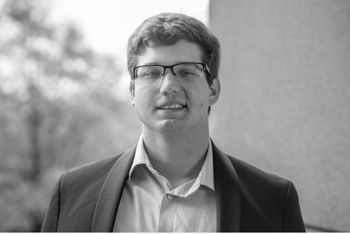'Discrimination, Exclusion and Indoctrination': State rep shares Iowa's efforts to combat DEI
Iowa state representative Taylor Collins told Campus Reform about Iowa’s efforts to combat DEI: ‘[I]f we see that DEI is still being peddled on our public universities . . . we're not just gonna go ahead and continue to write blank checks.’
Higher education institutions ‘have to be focused on preparing our students for the workforce, not just pushing out social justice warriors.’
In an interview with Campus Reform, Iowa state representative Taylor Collins spoke about legislative efforts in the state to fight back against DEI.
Speaking of wasteful spending due to the presence of DEI in universities, Collins mentioned an Education Appropriations Subcommittee meeting in which “the three university presidents in Iowa, Iowa State, University of Iowa, University of Northern Iowa, came in asking for their appropriations request . . . and they had over a $30 million request. And I thought that was a little steep.”
Collins then “quickly identified just four different positions where the total salary was over $750,000. Some of these DEI bureaucrats totally focused on peddling their own ideological agenda, making over $250,000 a year, obviously, that made some . . . headlines, even upset some Democrats in state government. And as a result [that] started a conversation on diversity, equity, [and] inclusion which really ought to stand for ‘discrimination, exclusion and indoctrination’ in our public universities.”
[RELATED: Iowa Board of Regents vote to curb DEI in state universities]
Collins claimed that legislation in the Iowa legislature “led to the president of the Iowa Board of Regents, our governing board for our public universities here in Iowa . . . officially giving [an] order to pause all DEI programming in the state of Iowa.”
“[W]e eventually got into the education appropriations budget, basically codifying what he had already done and saying, ‘We’re gonna pause this.’ And we ordered the Board of Regents to issue us a report and recommendations on how to deal with this issue. And while the Board of Regents was looking at this issue, they gave the order to eliminate DEI formally at their November board meeting,” he continued.
Speaking about appropriations, Collins said: [I]f we see that DEI is still being peddled on our public universities, I can tell you right now, we’re not just gonna go ahead and continue to write blank checks.”
Colleges and universities “have to be focused on preparing our students for the workforce, not just pushing out social justice warriors. That is not the point of higher education. We’ve seen really the moral fabric of society being decayed, and I think it starts at our public universities. You look back after the attack on Israel, before the blood was even dry in Israel, you had students celebrating what Hamas did, at our public universities, even here in Iowa. That is unacceptable. But it’s indicative, I think, of the position where higher education is at in this country, it needs significant reform,” said Collins.
Asked about the political climate in institutions of higher education, Collins replied: “It’s a toxic culture and it’s a toxic environment. You don’t have to look very far and talk to many students to find out that conservatives really are not welcome, nor are their ideas welcome at our state universities, especially when it comes to faculty members. Our numbers of conservative faculty are in the single digits. . . . we can’t have a . . . strong conservative government here in Iowa . . . and yet have [an] ideological bureaucracy being run at our public universities, we got to make sure that those universities are reflective of the political environment we’re seeing here in Iowa.”
When asked by Campus Reform what could be done to attract conservative faculty members, Collins said: “the biggest thing you can do is obviously eliminate DEI,” adding that “one of the recommendations that the Board of Regents put forward in that November meeting was eliminating the requirement on DEI statements, or DEI oaths that you have to take in order to apply for a position.”
[RELATED: Five Ohio campuses set to receive funding for ‘intellectual diversity’ centers]
“And you also have to make sure that you’re indicating to not only students, but also faculty members that we celebrate more than just surface diversity. Diversity of thought is very important, if not the most important thing. And we have to recognize the importance of that and ultimately promote it on campus,” he added.
Speaking further about promoting freedom of thought on campus, Collins added: “[O]ne of the most basic things we can do in order to encourage more intellectual diversity [is] simply putting an emphasis on citizenship. We were a country that was built on free speech, the importance of free speech. If we have students who don’t understand the basic founding principles of our country, of course, they’re not going to celebrate intellectual diversity. In fact, they want to thwart it many times.”
“We got to make sure that these institutions are not just not bastions of the left. . . . We want to make sure regardless of your political affiliation that you have a voice and that you’re welcome on our public universities. We shouldn’t be propping up one or pushing down the other. It ought to be an equal playing field and that’s all we’re asking for,” Collins concluded.

